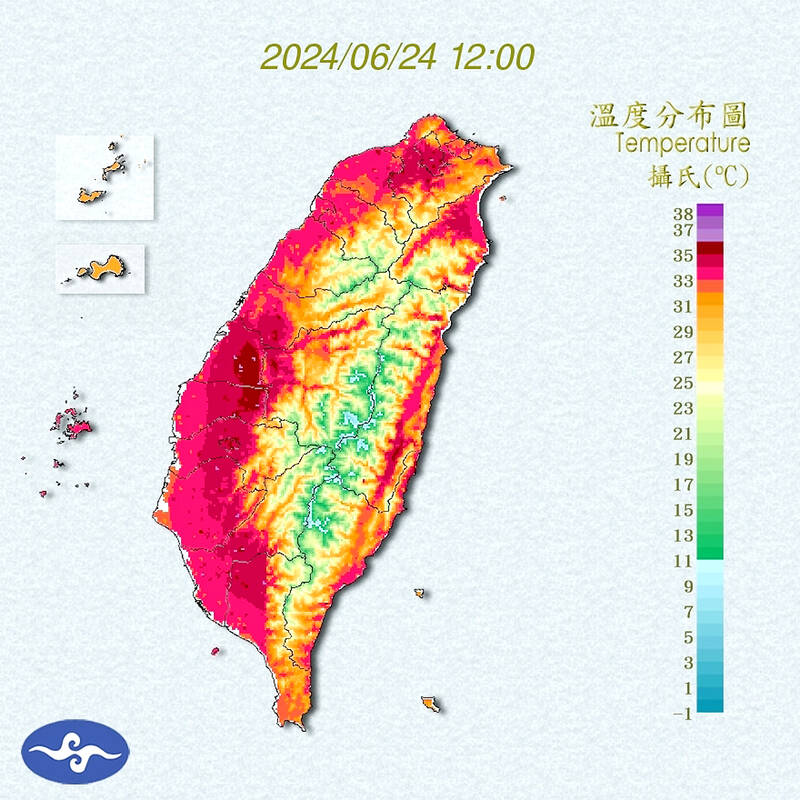Heat in the nation’s metropolitan areas is becoming increasingly difficult to dissipate due to climate change and increases in areas experiencing urban heat effects, a study conducted by National Cheng Kung University’s Building and Climate Lab (BCLab) showed.
The lab used weather data collected on Saturday last week and created a temperature map, which showed high-temperature areas in Taipei, New Taipei City and Taoyuan have expanded and could soon be connected to each other.
The phenomenon is similar to a 60km-long corridor near Tokyo experiencing urban heat effects, the study showed.

Photo: Screen grab from the Central Weather Administration
The lab’s temperature map showed that Taipei’s Wanhua District (萬華), which is in the center of the Taipei Basin, had an average temperature of 36.9°C, while the average temperature of Shilin District (士林), which is at the northern part of the city, was 37.3°C. The average temperatures in the two districts were higher than those in others, it showed.
The lowest average temperature, 34.9°C, was found in Daan Forest Park, the map showed.
The difference between high-temperature and low-temperature areas in Taipei is about 2.4°C, the map showed.
National Cheng Kung University architecture professor Lin Tzu-ping (林子平) said that although heat accumulated in Taipei for different reasons than in Taoyuan, people need to be aware that heat would become difficult to dissipate if its sources were concentrated in one place.
The average temperature in Wanhua was high because it is a low-lying area, while overdevelopment explains why Xinyi District (信義) is a high-temperature zone, Lin said.
The high-temperature area in Taoyuan is mainly in the river valley terrain, he said.
“Previous studies have shown that extremely high temperatures are likely to appear in the Taipei Basin at the end of the century. However, the highest temperature increase is more likely to appear in valley terrain in Taoyuan, particularly in Taoyuan (桃園) and Jhungli (中壢) districts,” Lin said.
So far, temperature differences between high-temperature and low-temperature areas in Taipei are about 2.5°C, he said, adding that records show that temperature differences sometimes reach 3.5°C.
Lin said that his research team found that high-temperature areas have been connected from Keelung to New Taipei City, Taipei and Taoyuan.
“When it becomes difficult for heat to dissipate, it means that there would be even fewer hours of the day where temperatures fall. If temperatures do not drop in the nighttime and heat accumulates the next day, it becomes an endless cycle of heat,” he said.
Hot weather, which normally does not occur until next month, has already occurred this month, Lin said.

South Korean K-pop girl group Blackpink are to make Kaohsiung the first stop on their Asia tour when they perform at Kaohsiung National Stadium on Oct. 18 and 19, the event organizer said yesterday. The upcoming performances will also make Blackpink the first girl group ever to perform twice at the stadium. It will be the group’s third visit to Taiwan to stage a concert. The last time Blackpink held a concert in the city was in March 2023. Their first concert in Taiwan was on March 3, 2019, at NTSU Arena (Linkou Arena). The group’s 2022-2023 “Born Pink” tour set a

CPBL players, cheerleaders and officials pose at a news conference in Taipei yesterday announcing the upcoming All-Star Game. This year’s CPBL All-Star Weekend is to be held at the Taipei Dome on July 19 and 20.

The Taiwan High Court yesterday upheld a lower court’s decision that ruled in favor of former president Tsai Ing-wen (蔡英文) regarding the legitimacy of her doctoral degree. The issue surrounding Tsai’s academic credentials was raised by former political talk show host Dennis Peng (彭文正) in a Facebook post in June 2019, when Tsai was seeking re-election. Peng has repeatedly accused Tsai of never completing her doctoral dissertation to get a doctoral degree in law from the London School of Economics and Political Science (LSE) in 1984. He subsequently filed a declaratory action charging that

The Hualien Branch of the High Court today sentenced the main suspect in the 2021 fatal derailment of the Taroko Express to 12 years and six months in jail in the second trial of the suspect for his role in Taiwan’s deadliest train crash. Lee Yi-hsiang (李義祥), the driver of a crane truck that fell onto the tracks and which the the Taiwan Railways Administration's (TRA) train crashed into in an accident that killed 49 people and injured 200, was sentenced to seven years and 10 months in the first trial by the Hualien District Court in 2022. Hoa Van Hao, a